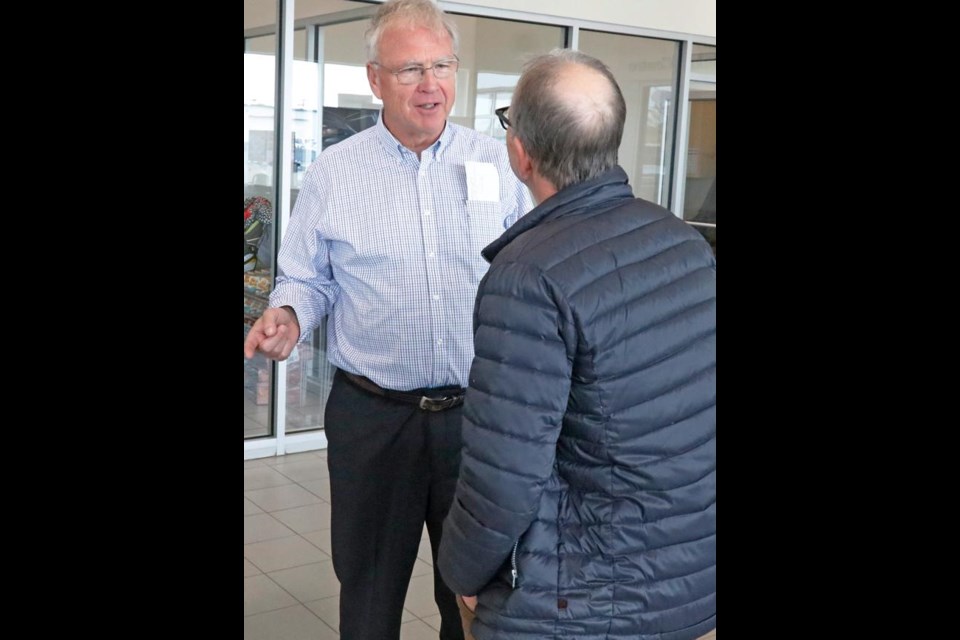There were many challenges to deal with when the COVID-19 pandemic hit, but with the support of staff and the community, a Weyburn businessman said they have been able to survive those challenges thus far.
Mal Barber, general manager of Barber Motors, a family-owned dealership in Weyburn that just celebrated their 70th anniversary last year, shared how they fared through the pandemic as he spoke via Zoom to the members of the Weyburn Rotary Club on Thursday.
Barber noted how through the years there have been many business challenges for auto dealers, such as in the 1940s and 50s, when many dealers in smaller communities lost their dealerships, and later in the 70s a number of dealers couldn’t make their loans.
This year the major challenge for every business, and for the economy as a whole, has been the COVID-19 pandemic, with the massive lockdown for over two months in the spring before things started reopening again.
Barber noted that as an auto dealer, they were considered an essential service so they were allowed to continuing operating the business. The impact of the lockdowns were still felt, said Barber, with sales of vehicles down by about 80 per cent, “not just for me but for a lot of business owners.”
In spite of this impact, Barber said the biggest challenge as a manager was to give hope to the staff through this time of uncertainty.
“I bought grocery cards for my staff. I felt they had to have something to feel good about,” said Barber. “The worst thing is to have someone under-employed with nothing to do. We had the staff take turns coming in to work, and we paid wages to the key people so they would know they were still needed.”
Some employees went on unemployment, with Barber’s idea to share the work and have it scheduled so everyone felt they were a part of the business.
“Our business has come back, and we’re up to the 75-per-cent range,” he said, commenting that the government has developed a plan that put the country into a welfare position, “which I would argue we are in right now.”
The dealership is back at 100-per-cent employment again, and Barber said, “We’re busy enough. No one has nothing to do.”
He attributed a big part of their survival to their customer base, noting that when things were really slow and no one was travelling anywhere, his rural customers brought in their vehicles for repairs and upgrades.
“Ranchers and farmers had been putting off fixing their vehicles, and they made a point of bringing them in at that time,” said Barber. “When the virus hit, people stopped driving. It helped me and helped the staff.”
He added these were examples of neighbours-helping-neighbours which is seen in rural communities more so than in large urban communities, “and I’ve seen a lot of that in the last three months.”
The other aspect to living in this community is people look at risks and challenges in a relational way, and residents here approach the situation in a completely different way.
Meantime, at the dealership, there have been many measures taken to accommodate the requirements of public health, such as making masks available at the door, and using disinfectant on the counters with plastic shielding around where the receptionist is located.
In addition, said Barber, they’ve piled up boxes or tires in front of areas like the receptionist desk, the service desk and the parts counter to ensure customers are keeping a physical distance from the staff.
The main area of the showroom where people come in is cleaned four times a day, twice in the morning and twice in the afternoon, and times of the cleaning are recorded and initialed. When a vehicle is brought in, all high-touch areas are cleaned.
Rotarian Gary Anderson noted he was one of the customers who bought a vehicle during this time, and said it seems like there are fewer vehicles on the lot.
Barber noted that one day they sold 27 units, but then the next day they only sold one. When COVID hit, the auto manufacturing plants were shut down for a time, and it then takes a long time for those plants to come back online and filling orders for new vehicles.
“It’s come a long ways in the last six weeks,” added Barber.
Another factor is the United States put on a tariff for any vehicles not made in the U.S., which has largely cut off the U.S. market for used trucks as they automatically lost $4-5,000 on their vehicles just due to the tariff.



